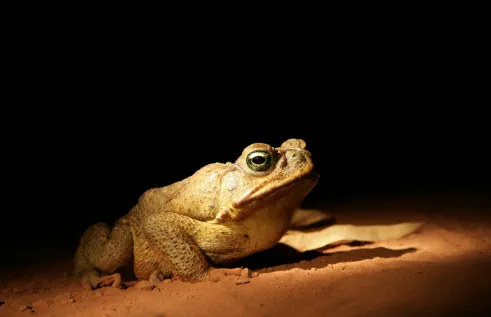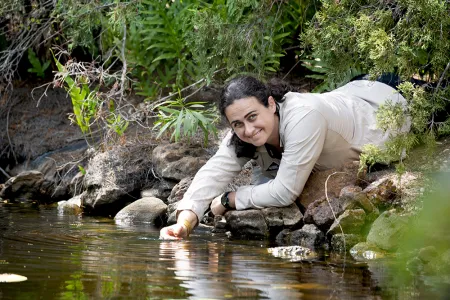News Article
CDU researcher named NT’s Young Tall Poppy
Charles Darwin University ecologist Dr Carla Eisemberg has won the Northern Territory Young Tall Poppy Science Award for 2020 for her outstanding research that has the potential to influence health and sustainable harvest enterprises in remote communities.
Awarded annually by the Australian Institute of Policy and Science (AIPS) to an early-to-mid career researcher, the prestigious award honours up-and-coming scientists who combine world-class research with a passionate commitment to communicating science.
Dr Eisemberg’s research focuses on relationships between wildlife ecology, harvest and conservation practices to assist communities to manage their resources. Her research on the northern long-necked turtle has shown that its meat has an extremely high concentration of iron.
“Wild meat is an important source of nutrients to remote communities,” Dr Eisemberg said.
“However, changes in harvesting technology and accessibility have increased the pressure on these resources.”
Her research results have the potential to influence future health programs addressing anaemia, as well as an inspiration for Indigenous enterprises in remote communities, such as turtle farming and sustainable harvest.
AIPS Chair Professor Maria Kavallaris OAM said a more scientifically engaged society was something every scientist should aspire to and the reason that Tall Poppy winners were so important.
“These Tall Poppies are excellent examples of the cutting-edge research being undertaken here in the Northern Territory,” she said.
“They also become role models by working with the education and community sectors to encourage greater engagement in science.”
Dr Eisemberg, who is the CDU Science Outreach Manager, also studies wildlife conservation and management practices in Northern Australia, Papua New Guinea, and the Brazilian Amazon. By comparing areas located in various regions of the globe but similar in weather and remoteness, her research identifies patterns and solutions towards wildlife conservation through local economic benefits and sustainable use.
Related Articles

Nanoplastics hindering cognitive abilities of fish, international research shows
Nanoplastic exposure can impair the cognitive abilities of fish and could lead to significant impacts on marine species’ ability to survive, according to a new international study.
Read more about Nanoplastics hindering cognitive abilities of fish, international research shows
Eradication would cost billions: NT’s lessons for Pilbara’s cane toad management
Cane toads are predicted to invade Western Australia’s Pilbara region by 2041 if left unchecked, but the Northern Territory’s population of the pests hold key lessons that could save billions in eradication costs.
Read more about Eradication would cost billions: NT’s lessons for Pilbara’s cane toad management
New project to grow Indigenous aquaculture on one of Australia’s largest islands
An Australian island’s efforts to improve food security and transition into a blue economy will be bolstered by a new project to propagate a nutritious and increasingly popular fish.
Read more about New project to grow Indigenous aquaculture on one of Australia’s largest islands
